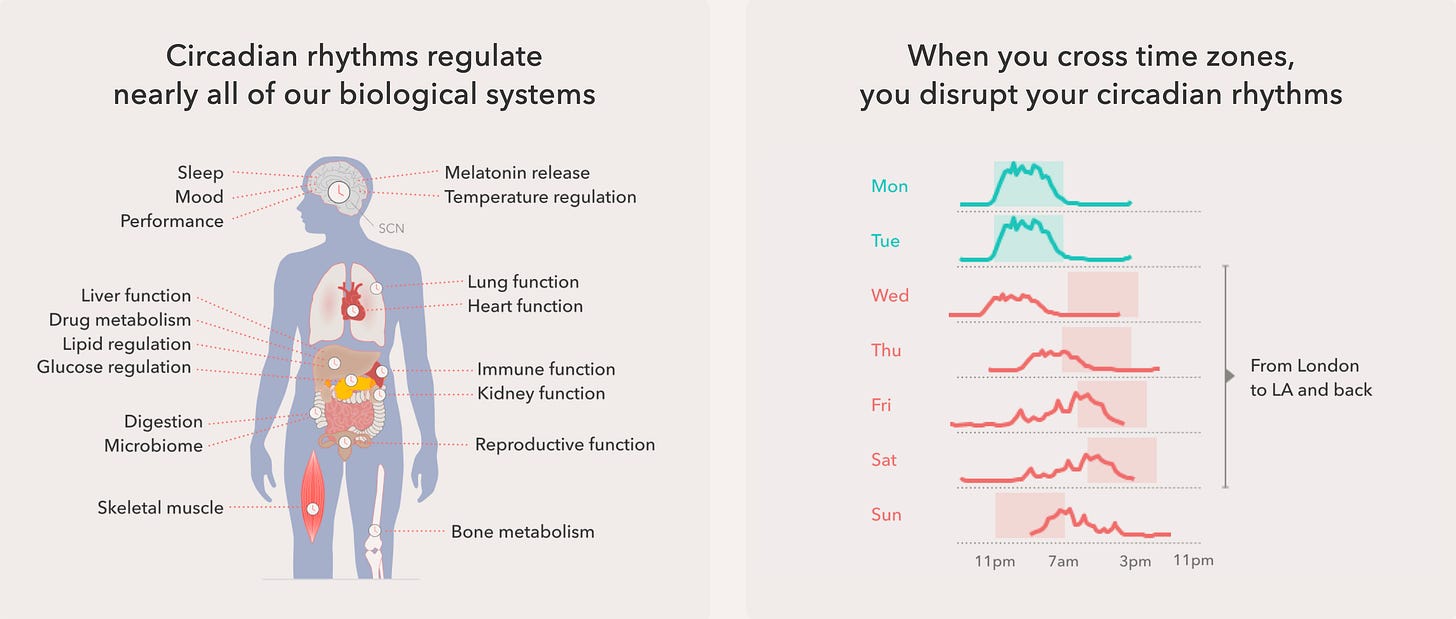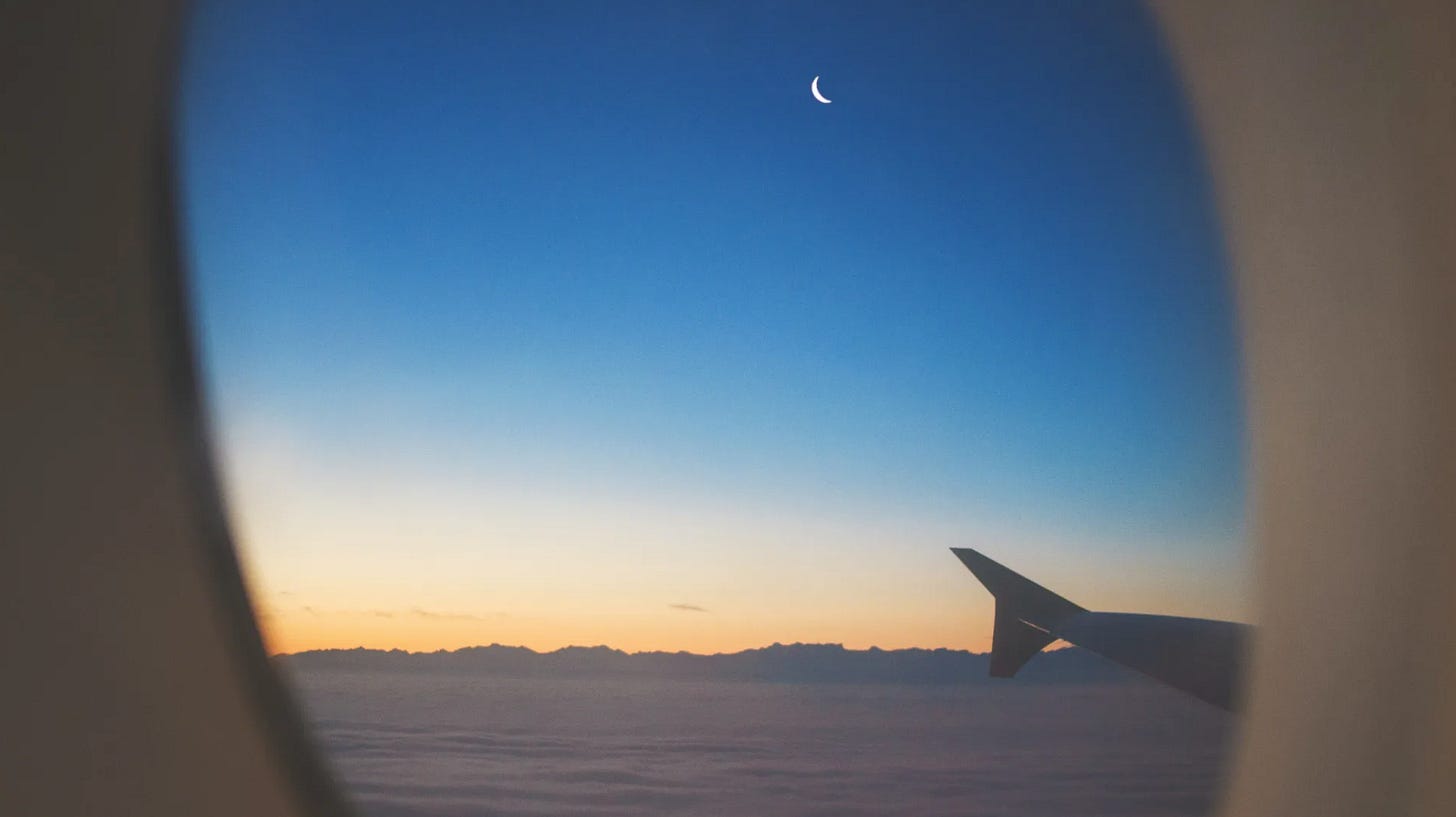Optimized on the Fly
A Health Coach's Guide to Conquering Jet Lag
A few years back, I joined a group of friends for a birthday expedition to Mongolia, a once-in-a-lifetime trip. With just a 48-hour layover in Seoul before our grand adventure, I aimed to make the most of our time in this vibrant city. Sadly, on our first night, jet lag had most of my travel companions barely making it through dinner.
Yet despite having traveled the same distance as them, I found myself quite energized, a boost I credited to one simple hack: fasting during my international flight from Los Angeles.
When it comes to your sleep-wake cycle, it’s common knowledge that light is a critical influence on neurotransmitters like serotonin and dopamine which increase alertness and energy during the day as well as melatonin production which promotes sleepiness at night.
But, did you know that eating patterns can affect a secondary master clock in the brain?
When we abstain from food and then consume a substantial meal when we land, we can trick our bodies into adjusting more quickly to a new time zone — a clever hack indeed!
What is Jet Lag?
It’s a temporary sleep problem that occurs when your natural circadian rhythms, which regulate the sleep-wake cycle, are disrupted. The common symptoms are fatigue, headaches, digestive issues, irritability and problems concentrating.
What causes it? Jet lag occurs when our body’s internal clock is out of sync with cues from the new time zone. In other words, your body is still at home. The symptoms are worse, the farther you travel. For each time zone you cross, you could need up to a day to recover.

✈️ How to Optimize Your Travel Routine
Besides feeling exhausted and hung over, jet lag can seriously cut into your fun time on vacation or impact your performance on a work trip. It’s worth exploring some ways to boost your health as you travel.
1/ Fast on the Plane
As mentioned, this 16 hour fasting method has worked for me several times and it’s manageable, especially during long overnight flights when you might be asleep for part of it. I initiate a fast upon arriving at the airport, which isn’t a sacrifice considering the typically uninspiring and unhealthy options available. Then I refrain from eating until touchdown in the destination’s time zone.
Researchers from Harvard and Beth Israel discovered that brief periods of fasting pause our internal clock, reactivating when food is reintroduced1. This suspension of our biological clocks likely stems from ancient survival instincts, where hunger kept people alert for foraging.
Furthermore, there are other compelling reasons to avoid snacking throughout the flight. The reduced air pressure in cabins and bodily gas expansion can disrupt our digestion and lead to bloating. Plus, we aren’t expending much energy reclining in our seats for hours on end, which is terrible for glucose disposal.
2/ Use the TimeShifter App
I learned this gem from Ben Nemtin, one of the world's top motivational speakers, who jets off to exotic destinations several times weekly, yet never loses his infectious energy — on or off the stage. This app taps into circadian science, supporting the body's adaptation to shifting time zones. Simply input your flight details, and it generates a personalized travel plan to avoid jet lag. From advising on optimal light exposure and rest times to suggesting ideal moments for caffeine, it's got you covered. All you'll need is the app, a sleep mask, dark sunglasses, and melatonin (optional).
3/ Stay Hydrated
Cabins maintain low humidity levels, making the air drier than what we encounter on the ground, thus increasing the likelihood of dehydration. It's crucial to prioritize drinking water (or decaffeinated tea), even if it results in a few extra trips to the bathroom. Personally, I find adding a dash of LMNT electrolytes or a squeeze of lemon to my water enhances both flavor and replenishment. And while it may not be the news we want to hear, alcohol isn't the best companion on a flight due to its diuretic properties.
The take-away: Jet lag doesn't have to throw a wrench in your travel agenda if you understand how to nurture your circadian rhythm, the master regulator of our body's biological functions. Be strategic about your light exposure and eating times to optimize your energy levels as well as your vacation experience.
All writing is for informational and entertainment purposes only and is not a substitute for medical advice, diagnosis or treatment.



I really appreciate all that you are sharing!
Not a moment too soon. Just in time for packing. Thanks for this!